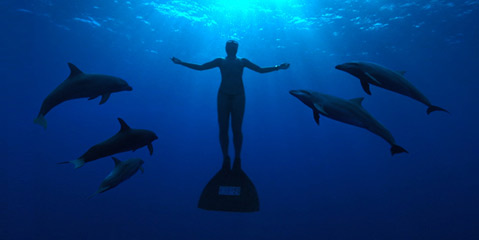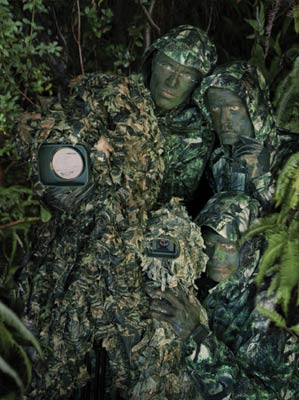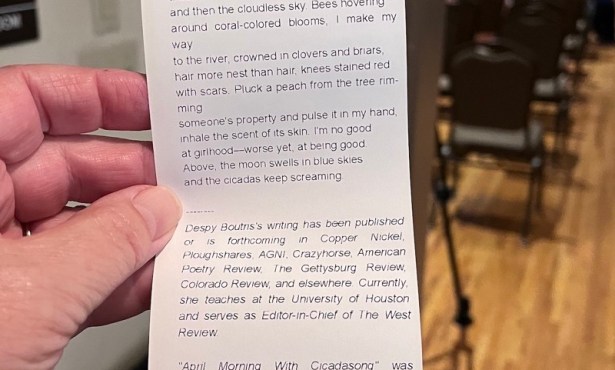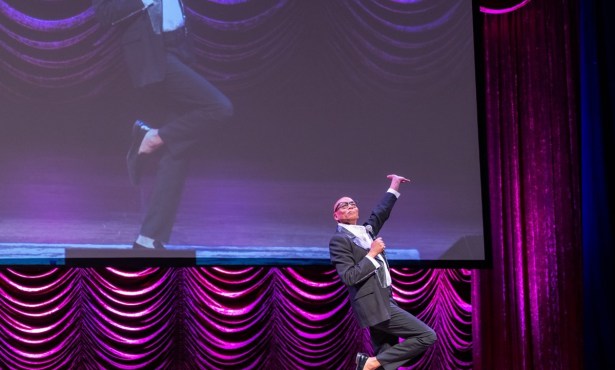A Killer Casting Call
Eco-Thriller The Cove Reveals Dolphin Slaughter

Many people may be deterred from going to see The Cove by the prospect of violence against our fun-loving, intelligent, cetacean friends who are often found swimming off the coast of Santa Barbara. It’s safe to say that no one would like to see the smile wiped from a dolphin’s face.
The good news: It never is. The bad news: It never can be.
“The dolphin’s smile is nature’s greatest deception,” explains The Cove‘s protagonist Richard O’Barry, of the fluke of anatomy that causes the animals’ mouths to turn up at the ends. O’Barry is the trainer behind the highly successful Flipper series’ dolphins. It was when Kathy, one of the five dolphins who played the Flipper character, committed suicide in his arms-dolphins are conscious breathers and Kathy chose not to take another breath-that O’Barry realized the animals should not be kept in captivity. The next day he was arrested for trying to illegally free a dolphin from captivity.

Since then, O’Barry has found more fruitful and law-abiding ways to combat the captivity of marine mammals, specifically in his present position as the marine mammal specialist at Earth Island Institute. In his most recently publicized venture, O’Barry joined a team of activists, techies, and divers to spread awareness of the brutal slaughter of dolphins in a secluded cove at Taiji; the small Japanese town that has grown famous for its annual dolphin hunt, which accounts for only a fraction of the 20,000-plus dolphins and porpoises killed each year.
Described by “clandestine operations” head Charles Hambleton as “a real-life eco-thriller,” The Cove focuses on the Taiji cove massacres to present a shockingly informative look into the cover-ups taking place around marine mammal hunting. Although violence is inevitable, The Cove‘s main scene of brutality is quick, like ripping off a Band-Aid. But this is a Band-Aid with too much adhesive, one that leaves a lasting mark. By far more horrifying than the violence is the exposure of the deception.
The dolphins in Taiji-kidnapped from their migratory route along the coast of Japan-are recruited for a casting call of sorts involving dolphin trainers around the world, who’ll pay upward of $150,000 per animal. The dolphins that are rejected are then forced deeper into the cove and speared to death. Their meat, which can contain nearly 2,000 ppm of mercury, is then sold in Japan as whale meat. At one time, the meat was even included in a free lunch program in Japanese schools.
It’s no wonder the Tokyo International Film Festival is the only film fest that refuses to accept The Cove as an entry, according to Hambleton, despite the festival’s Action! for Earth theme. At a recent screening in Santa Barbara, Hambleton spoke of the ways people can change the practice, and he and dolphin expert Dr. Toni Frohoff answered questions from the audience. Hambleton revealed that the divers hired to retrieve the slaughtered dolphins only make about $100 per day, and the majority of the workers took part in the killings just to earn extra pocket change. Hambleton also recounted the words of a five-year-old boy from a recent screening in L.A., whose question summarized the audience reaction: “Why did they hurt them?”
But The Cove is about more than the violence captured in Taiji. Said Frohoff, “Dolphins are never domestic, even if they are trained.” Hambleton agreed; “Some people say ‘It’s okay because they were born in captivity.’ [The same thing] used to be said about slaves.”
The revolt against programs that hold these self-aware mammals in captivity is contagious. Hambleton noted that a young recipient of the Make-A-Wish Foundation changed her wish from swimming with a dolphin [in captivity] to swimming with dolphins in the wild. While O’Barry openly admits that his desire for self-redemption sparked his activism, Frohoff believes this film offers more than that. She explained, “[The Cove] is an opportunity for humanity’s redemption.”
4•1•1
The Cove is showing at Santa Barbara’s Plaza de Oro theater.



